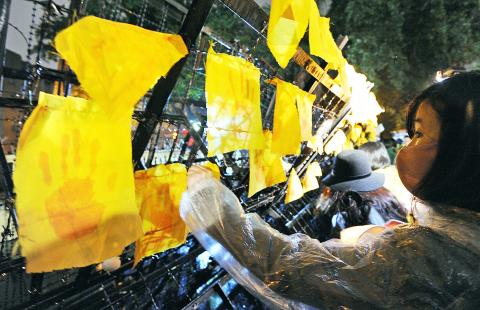Leading Sunflower movement figures and opposition legislators yesterday voiced their anger over the police crackdown during the occupation of the Executive Yuan in Taipei on the night of March 23 to the early hours of March 24 last year, saying that many of the victims seeking justice have been left out in the cold.
At the Legislative Yuan’s plenary session yesterday, Taiwan Solidarity Union Legislator Chou Ni-an (周倪安) questioned Premier Mao Chi-kuo (毛治國) over the matter, accusing the government of turning a deaf ear to victims’ demands for justice to be served.
Chou, who sustained injuries during the incident on March 24 last year, said she was there to protect the students and experienced brutal treatment by the police.

Photo: Liu Hsin-de, Taipei Times
“After I was knocked to the ground, four riot police used their shields and boots to kick and hit me repeatedly,” she said.
“We know that videos from police cameras can be used to identify students and protesters, as the government was able to indict them,” Chou said. “Why can the same footage not single out any police officers who beat people so viciously?”
Chou called on the government to come clean on that night’s crackdown and “end the cover-up,” accusing authorities of destroying evidence to prevent the prosecution of police officers.
The occupation of the Executive Yuan, led by student Dennis Wei (魏揚) and others, was a spinoff of the Sunflower movement that occupied the Legislative Yuan’s main chamber from March 18 to April 10 to protest the government’s handling of the cross-strait service trade agreement.
On Monday evening, dozens of students and activists took part in a silent procession around the Executive Yuan compound to mark the one-year anniversary of the bloody police crackdown. Led by youth activist group Black Island National Youth Front, the crowd hung handkerchiefs with bloody hand prints on the barbed-wire barricades.
Wei, a member of the group, said the images of riot police carrying batons and marching in locked steps toward the sit-in crowd often came back to haunt him.
“I will never forget what happened that night, especially not my friends bleeding from being beaten by police as they held me and cried out in pain,” said Wei, who is one of 119 Sunflower movement protesters who have been indicted.
“Over the past year, neither former premier Jiang Yi-huah (江宜樺) nor former National Police Agency director-general Wang Cho-chiun (王卓鈞) have apologized for their roles in these acts of violence against the public,” he said.
He added that as the public commemorates the one-year anniversary of the Executive Yuan occupation, “we must point out these two as the main perpetrators of the violence and not, as government officials are doing now, blaming the protesters for their ‘irresponsible’ actions.”

Chinese Nationalist Party (KMT) Chairman Eric Chu (朱立倫), spokeswoman Yang Chih-yu (楊智伃) and Legislator Hsieh Lung-chieh (謝龍介) would be summoned by police for questioning for leading an illegal assembly on Thursday evening last week, Minister of the Interior Liu Shyh-fang (劉世芳) said today. The three KMT officials led an assembly outside the Taipei City Prosecutors’ Office, a restricted area where public assembly is not allowed, protesting the questioning of several KMT staff and searches of KMT headquarters and offices in a recall petition forgery case. Chu, Yang and Hsieh are all suspected of contravening the Assembly and Parade Act (集會遊行法) by holding

PRAISE: Japanese visitor Takashi Kubota said the Taiwanese temple architecture images showcased in the AI Art Gallery were the most impressive displays he saw Taiwan does not have an official pavilion at the World Expo in Osaka, Japan, because of its diplomatic predicament, but the government-backed Tech World pavilion is drawing interest with its unique recreations of works by Taiwanese artists. The pavilion features an artificial intelligence (AI)-based art gallery showcasing works of famous Taiwanese artists from the Japanese colonial period using innovative technologies. Among its main simulated displays are Eastern gouache paintings by Chen Chin (陳進), Lin Yu-shan (林玉山) and Kuo Hsueh-hu (郭雪湖), who were the three young Taiwanese painters selected for the East Asian Painting exhibition in 1927. Gouache is a water-based

Taiwan would welcome the return of Honduras as a diplomatic ally if its next president decides to make such a move, Minister of Foreign Affairs Lin Chia-lung (林佳龍) said yesterday. “Of course, we would welcome Honduras if they want to restore diplomatic ties with Taiwan after their elections,” Lin said at a meeting of the legislature’s Foreign Affairs and National Defense Committee, when asked to comment on statements made by two of the three Honduran presidential candidates during the presidential campaign in the Central American country. Taiwan is paying close attention to the region as a whole in the wake of a

OFF-TARGET: More than 30,000 participants were expected to take part in the Games next month, but only 6,550 foreign and 19,400 Taiwanese athletes have registered Taipei city councilors yesterday blasted the organizers of next month’s World Masters Games over sudden timetable and venue changes, which they said have caused thousands of participants to back out of the international sporting event, among other organizational issues. They also cited visa delays and political interference by China as reasons many foreign athletes are requesting refunds for the event, to be held from May 17 to 30. Jointly organized by the Taipei and New Taipei City governments, the games have been rocked by numerous controversies since preparations began in 2020. Taipei City Councilor Lin Yen-feng (林延鳳) said yesterday that new measures by